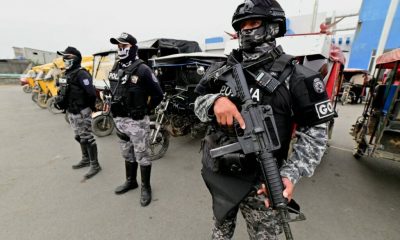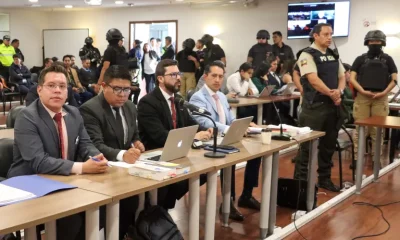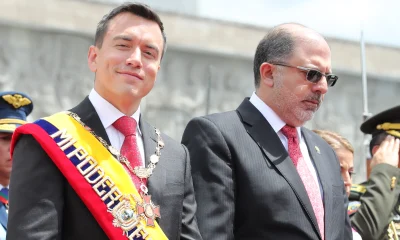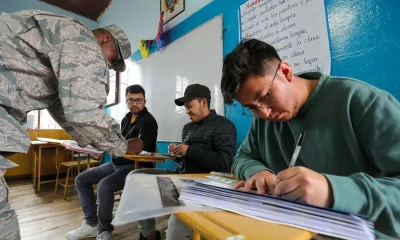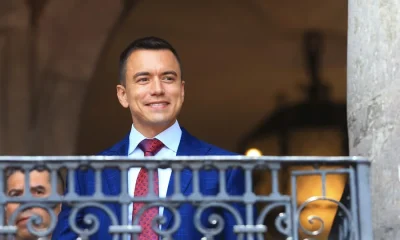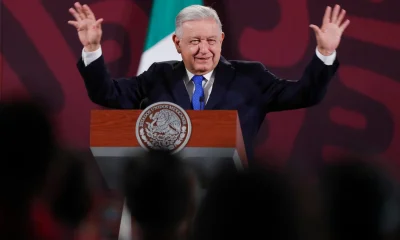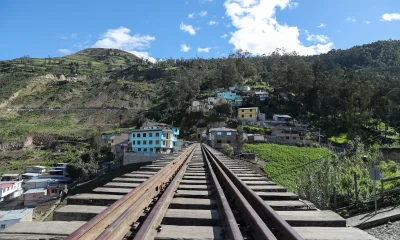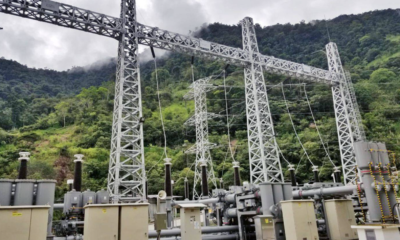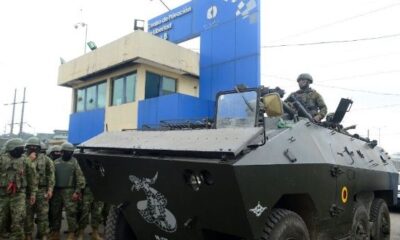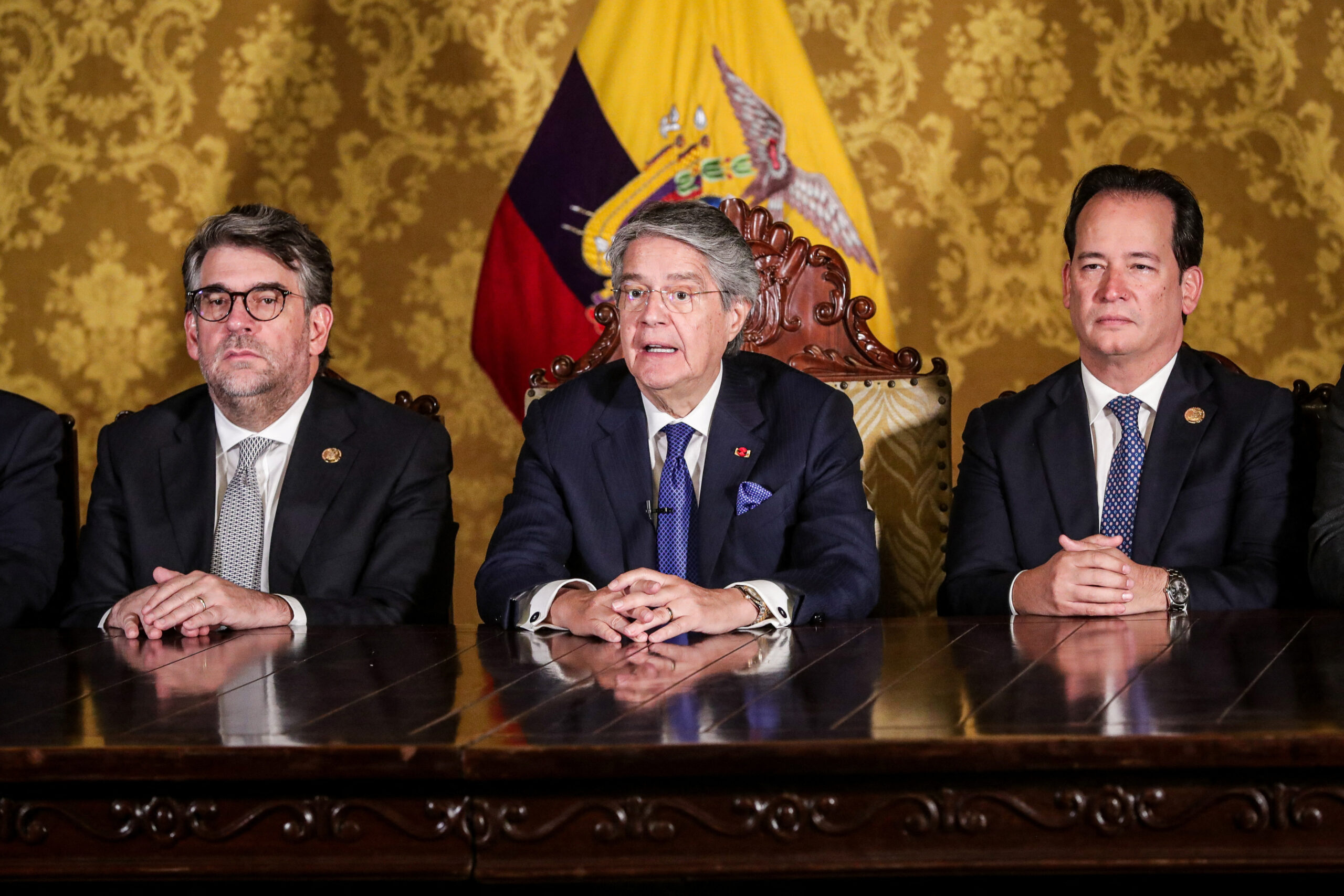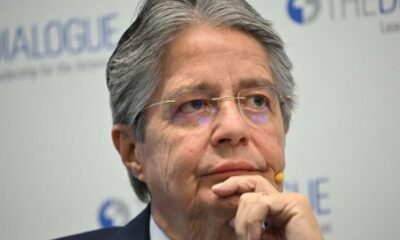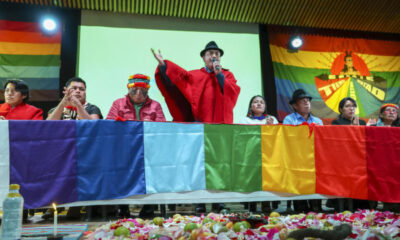International
Ecuador: Lasso admits defeat in referendum, calls for unity
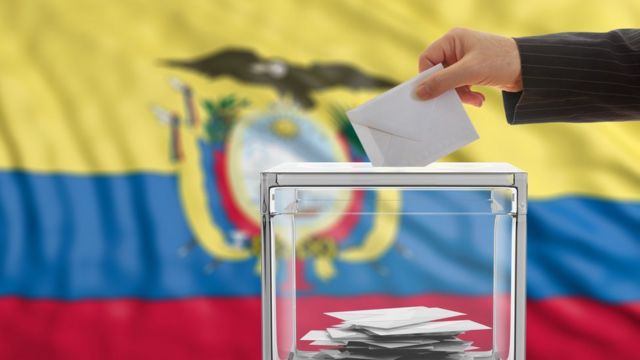
February 7th |
The president of Ecuador, Guillermo Lasso, admitted on Monday that the adverse results in a referendum and the election of sectional authorities held on Sunday were a wake-up call to the government, before which he called for a great national agreement to solve the demands of Ecuadorians.
The winners of these elections were the opposition parties Union for Hope, of former President Rafael Correa, and Pachakutik, of the indigenous people, according to preliminary results.
In a radio and television chain, Lasso said that beyond the results, citizens yearn for a better country with more security, better education and health, more work, better jobs and salaries.
“What happened on Sunday was a wake-up call from the people to the government and we will not shirk that responsibility.”
He added that after those results the “commitment with Ecuadorians becomes even firmer” on issues such as security, job generation and expansion of social assistance, among others, while ratifying his decision to get closer to the people, to listen and to learn.
With around 50% of the votes counted, the tendency was that the “No” was imposed in the eight questions posed in the referendum promoted by the government and whose attention was focused on the issue of citizen security, in a country hit by the problem of criminality and drug trafficking.
The referendum was seen as a thermometer of the performance of Lasso, a 67-year-old banker who took office in May 2021.
“The results are dramatic for the government, because the consultation could have been an oxygen tank for a highly unpopular government,” said Grace Jaramillo, of the University of British Columbia in Vancouver, Canada, in an interview with AP. He still has two years of “extremely difficult government left, with probable attempts to remove him from power”.
As for the elections, Correa’s party (2007-2017), obtained important results. Correa resides abroad.
According to partial results, the candidates of Union for Hope Pabel Muñoz and Aquiles Álvarez won the mayoralties of Quito and Guayaquil, respectively. In the municipality of Guayaquil they obtained a triumph leaving behind 31 years of government of the right-wing Social Christian party.
Meanwhile, Paola Pabón won the election for the prefecture (governorship) of the province of Pichincha, Marcela Aguiñaga in that of Guayas and Leonardo Orlando in that of Manabí, which are among the most important in the country.
Analyst Mónica Banegas, of the network of political scientists and director of the Haciendo Ecuador Foundation, told AP that the government is “very worn out and besieged” by an adverse political environment, in which not only the government but also the country loses because there were questions to solve institutional and people’s problems.
In the central Andean highlands, the opposition party Pachakutik, also of the indigenous people, has won three prefectures and several mayoralties. The indigenous movement cornered the government for three weeks last June with violent protests to reject an increase in gasoline prices.
Three of the eight questions were related to security, including one on constitutional reforms to allow extradition of Ecuadorians wanted by other countries in criminal proceedings for drug trafficking or organized crime. The Ecuadorian Constitution does not currently allow for the extradition of nationals to face trials or serve sentences in other countries.
This was one of the questions most promoted by the Lasso government, appealing to the insecurity in the country and in a social context of fear and perception of vulnerability due to the increase in crimes.
Ecuador ended last year with a record number of murders. The 4,539 violent deaths in 2022, according to the police count, are more than double the 2,048 crimes in 2021 and, in addition, the highest record since 1990 when this type of statistics began to be counted. Only about 300 cases were solved, according to authorities.
In view of citizen disenchantment with politics and institutions, two questions sought changes in the functioning of the Council of Citizen Participation, which appoints the main control authorities such as the prosecutor, the attorney general or comptroller, and two others had to do with political parties and the composition of the National Assembly, the institution with the worst percentage of citizen approval, according to polls.
According to analyst Banegas, Lasso must now initiate dialogues with all political and social sectors, change his strategy and tune in with the needs of the majorities in order to survive the remaining two years in power, she said.
International
U.S. Senate Rejects Budget, Bringing Government Closer to Shutdown Amid DHS Dispute

The U.S. Senate voted on Thursday against a budget proposal in a move aimed at pressuring changes at the Department of Homeland Security (DHS), following the killing of two civilians during a deployment of immigration agents in Minneapolis.
All Senate Democrats and seven Republican lawmakers voted against the bill, which requires 60 votes to advance, pushing the country closer to a partial government shutdown that would cut funding for several agencies, including the Pentagon and the Department of Health.
The rejection came as Senate leaders and the White House continue negotiations on a separate funding package for DHS that would allow reforms to the agency. Proposed measures include banning Immigration and Customs Enforcement (ICE) agents from wearing face coverings and requiring them to use body-worn cameras during operations.
The vote took place just hours after President Donald Trump said he was “close” to reaching an agreement with Democrats and did not believe the federal government would face another shutdown, following last year’s record stoppage.
“I don’t think the Democrats want a shutdown either, so we’ll work in a bipartisan way to avoid it. Hopefully, there will be no government shutdown. We’re working on that right now,” Trump said during a Cabinet meeting at the White House.
International
Trump Says Putin Agreed to One-Week Halt in Attacks on Ukraine Amid Extreme Cold

U.S. President Donald Trump said on Thursday that he secured a commitment from Russian President Vladimir Putinto halt attacks against Ukraine for one week, citing extreme weather conditions affecting the region.
“Because of the extreme cold (…) I personally asked Putin not to attack Kyiv or other cities and towns for a week. And he agreed. He was very pleasant,” Trump said during a Cabinet meeting broadcast by the White House.
Trump acknowledged that several advisers had questioned the decision to make the call.
“A lot of people told me not to waste the call because they wouldn’t agree. And he accepted. And we’re very happy they did, because they don’t need missiles hitting their towns and cities,” the president said.
According to Trump, Ukrainian authorities reacted with surprise to the announcement but welcomed the possibility of a temporary ceasefire.
“It’s extraordinarily cold, record cold (…) They say they’ve never experienced cold like this,” he added.
Ukrainian President Volodymyr Zelensky later commented on the announcement, expressing hope that the agreement would be honored.
International
Storm Kristin Kills Five in Portugal, Leaves Nearly 500,000 Without Power

Storm Kristin, which battered Portugal with heavy rain and strong winds early Wednesday, has left at least five people dead, while nearly half a million residents remained without electricity as of Thursday, according to updated figures from authorities.
The revised death toll was confirmed to AFP by a spokesperson for the National Emergency and Civil Protection Authority (ANPEC). On Wednesday, the agency had reported four fatalities.
Meanwhile, E-Redes, the country’s electricity distribution network operator, said that around 450,000 customers were still without power, particularly in central Portugal.
Emergency services responded to approximately 1,500 incidents between midnight and 8:00 a.m. local time on Wednesday, as the storm caused widespread disruptions.
The Portuguese government described Kristin as an “extreme weather event” that inflicted significant damage across several regions of the country. At the height of the storm, as many as 850,000 households and institutions lost electricity during the early hours of Wednesday.
Several municipalities ordered the closure of schools, many of which remained shut on Thursday due to ongoing adverse conditions.
Ricardo Costa, regional deputy commander of the Leiria Fire Brigade, said residents continue to seek assistance as rainfall persists.
“Even though the rain is not extremely intense, it is causing extensive damage to homes,” he noted.
In Figueira da Foz, a coastal city in central Portugal, strong winds toppled a giant Ferris wheel, underscoring the severity of the storm.
-

 International4 days ago
International4 days agoU.S. Senate Rejects Budget, Bringing Government Closer to Shutdown Amid DHS Dispute
-

 Central America3 days ago
Central America3 days agoPanama Supreme Court Strikes Down Panama Ports Concession as Unconstitutional
-

 International4 days ago
International4 days agoStorm Kristin Kills Five in Portugal, Leaves Nearly 500,000 Without Power
-

 Central America3 days ago
Central America3 days agoU.S. and Guatemala Sign Trade Deal Granting Zero Tariffs to Most Exports
-

 International4 days ago
International4 days agoMan Arrested After Vehicle Crashes Into Jewish Institution in Brooklyn
-

 International4 days ago
International4 days agoTrump Says Putin Agreed to One-Week Halt in Attacks on Ukraine Amid Extreme Cold
-

 Central America1 day ago
Central America1 day agoCosta Rica Goes to the Polls as Voters Choose Continuity or Change



























